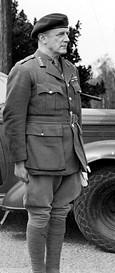Sir Robert Grice Sturges | |
|---|---|
Sturges in April 1944.  | |
| Born | 14 July 1891 Borough of Wokingham, England |
| Died | 12 September 1970 (aged 79) Exeter, England |
| Allegiance | United Kingdom |
| Service/ | Royal Navy (1908–12) Royal Marines (1912–46) |
| Years of service | 1908–46 |
| Rank | Lieutenant General |
| Commands held | Special Service Group (1943–45) Royal Marines Division (1940) |
| Battles/wars | First World War
|
| Awards | Knight Commander of the Order of the British Empire Companion of the Order of the Bath Distinguished Service Order Mentioned in Despatches (2) |
Lieutenant General Sir Robert Grice Sturges KBE, CB, DSO (14 July 1891 – 12 September 1970) was a senior Royal Marines officer who fought in both the First World War and Second World War.
Military career
Sturges joined the Royal Navy in 1908.[1] Commissioned a sub-lieutenant on 15 May 1912,[2] he transferred to the Royal Marines as a lieutenant from the same date (confirmed on 19 December 1914).[1][3] He served in the First World War, seeing action in the Gallipoli Campaign and the Battle of Jutland, and receiving promotion to captain on 30 January 1917.[4][5] He was officially transferred to the Royal Marine Light Infantry on 30 January 1917.[6]
Between the wars, he was promoted to major on 17 June 1929,[7] and to lieutenant colonel on 1 April 1936.[8] He was brevetted colonel and promoted to colonel on 3 April 1939 (seniority 31 December 1938).[9]
During the Second World War he was the commander of the British occupation of Iceland in May 1940. He was promoted to acting colonel commandant and temporary brigadier on 4 June,[10] and was mentioned in despatches in July.[11] He was Commander of the British occupation of Madagascar in 1942.[1] He went on to be Commander of the Special Service Group (Commandos) in 1943.[1] He was described as "intrepid in action, ruddy in countenance, and forcefully bucolic in language".[12] He retired in 1946.[1]
References
- Notes
- ^ a b c d e "Robert Grice Sturges". Liddell Hart Centre for Military Archives. 2015. Retrieved 28 April 2015.
- ^ "No. 28609". The London Gazette. 17 May 1912. p. 3583.
- ^ "No. 29015". The London Gazette. 22 December 1914. p. 10918.
- ^ Whitehead, p. 352.
- ^ "No. 29972". The London Gazette. 6 March 1917. p. 2255.
- ^ "No. 31924". The London Gazette. 1 June 1920. p. 6084.
- ^ "No. 33520". The London Gazette. 26 July 1929. p. 4926.
- ^ "No. 34273". The London Gazette. 10 April 1936. p. 2385.
- ^ "No. 34614". The London Gazette (Supplement). 7 April 1939. p. 2344.
- ^ "No. 34958". The London Gazette. 1 October 1940. p. 5785.
- ^ "No. 34890". The London Gazette (Supplement). 5 July 1940. p. 4152.
- ^ Lockhart, p. 34.
- Sources
- Survey of the Papers of Senior UK Defence Personnel, 1900–1975. Liddell Hart Centre for Military Archives.
- Lockhart, R. H. Bruce (1950). The Marines Were There: The Story of the Royal Marines in the Second World War. Putnam, London.
- Whitehead, Þór (1995). Milli vonar og ótta: Ísland í síðari heimsstyrjöld. Vaka-Helgafell, Reykjavík. ISBN 9979-2-0317-X.